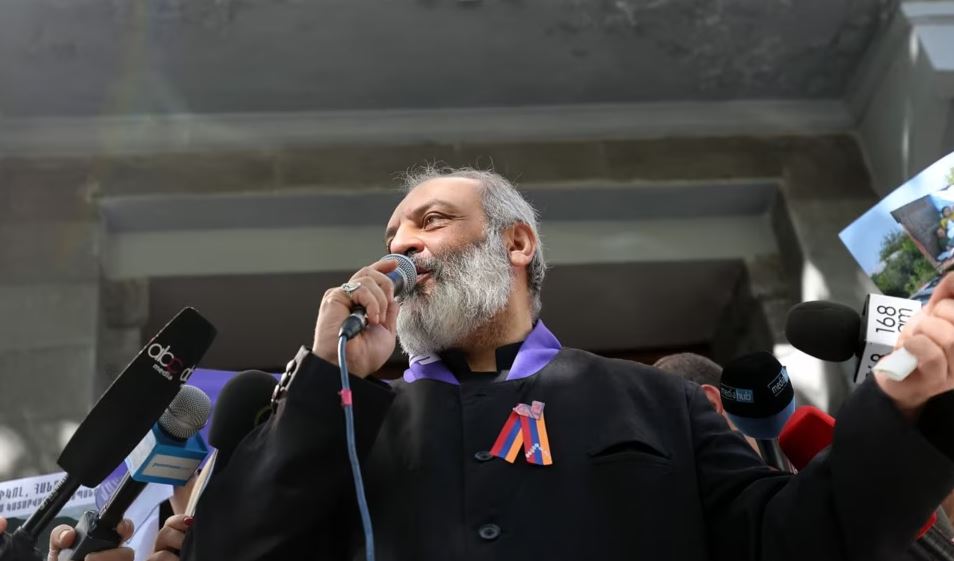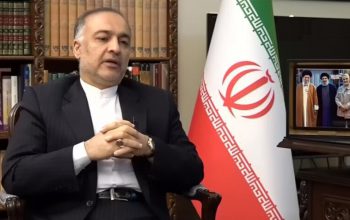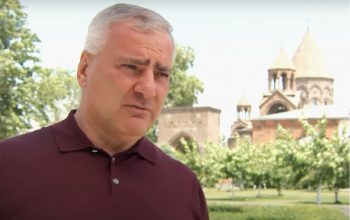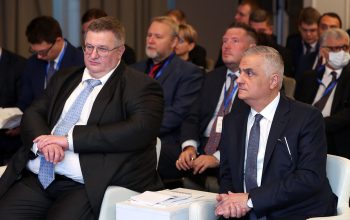Archbishop Bagrat Galstanian led a protest outside the Armenian prosecutor’s office on Wednesday, demanding criminal charges against Prime Minister Nikol Pashinyan. The demonstration is part of a broader movement seeking Pashinyan’s removal from office, with growing accusations that his actions—particularly during the Azerbaijani assault on Nagorno-Karabakh—have severely undermined Armenia’s national interests. Critics argue that his recent speech at the UN General Assembly only deepened their concerns, equating his statements to high treason.
Galstanian didn’t mince words as he stood outside the Prosecutor-General’s office in Yerevan. “The leader of the Republic of Armenia, or the person occupying that position, who is supposed to guarantee the security of our people, stood by idly and became complicit in the crimes committed by Azerbaijan and its president,” he charged, reflecting the deep disillusionment felt by many Armenians who believe their government failed them during a critical moment.
Opposition lawyer Hovannes Khudoyan reinforced these accusations, emphasizing that Armenia had a clear constitutional duty to defend the Armenian population of Karabakh. He referenced the 1989 unification act adopted by Soviet Armenian and Karabakh legislatures, which he argued provided Armenia with a legal framework to defend the region from Azerbaijani aggression in September 2023. This legal obligation, Khudoyan said, was ignored under Pashinyan’s leadership, forcing tens of thousands of ethnic Armenians to flee their homeland.
Pashinyan’s willingness to entertain Azerbaijan’s demands—particularly concerning the repeal of the constitutional reference to the 1989 act—has only fueled these concerns. In his September 27 speech, Pashinyan suggested that he would comply with this demand if Armenia’s Constitutional Court determines it does not violate the constitution. Critics like Khudoyan see this as a dangerous concession to Azerbaijani interests, accusing Pashinyan of echoing the very propaganda being used by Armenia’s enemies.
The claims from Pashinyan and his allies, including those that blame the authorities in Stepanakert and opposition figures in Yerevan for the Azerbaijani takeover of Karabakh, have been met with widespread skepticism. In June, Pashinyan asserted that the exiled leadership of Karabakh, along with opposition leaders in Armenia, conspired to force the region’s population to flee to Armenia in an effort to destabilize his government. These accusations, lacking in substantial evidence, have been dismissed by many as attempts to shift responsibility away from his administration’s failings.
Galstanian’s protests, which resumed on October 2 after a three-month break, are gaining traction despite attempts to downplay their significance. On Sunday, he led a rally in Yerevan’s Republic Square, where his supporters criticized the judges of the Constitutional Court for downplaying the significance of the contested constitutional clause that has long been resented by Baku. The judges, appointed mostly by Pashinyan’s government, have been accused of prioritizing the current administration’s political survival over the legal defense of Armenia’s territorial integrity.
Vahagn Aleksanyan, a deputy chairman of Pashinyan’s Civil Contract party, dismissed the demands for the prime minister’s prosecution, echoing the unfounded claims that opposition figures are to blame for the current crisis. This reaction is unsurprising, given the widespread belief that prosecutors, many of whom have close ties to Pashinyan, will protect him from accountability.
Despite the obstacles, Galstanian remains undeterred. While his recent rallies have seen smaller crowds compared to earlier in the year, the momentum for change has not faded. At a rally over the weekend, Galstanian acknowledged that mistakes had been made in the past but urged his supporters to remain steadfast. He framed the struggle as a “war of nerves” against a government that, in the eyes of many, has lost its legitimacy and no longer represents the interests of the Armenian people.




